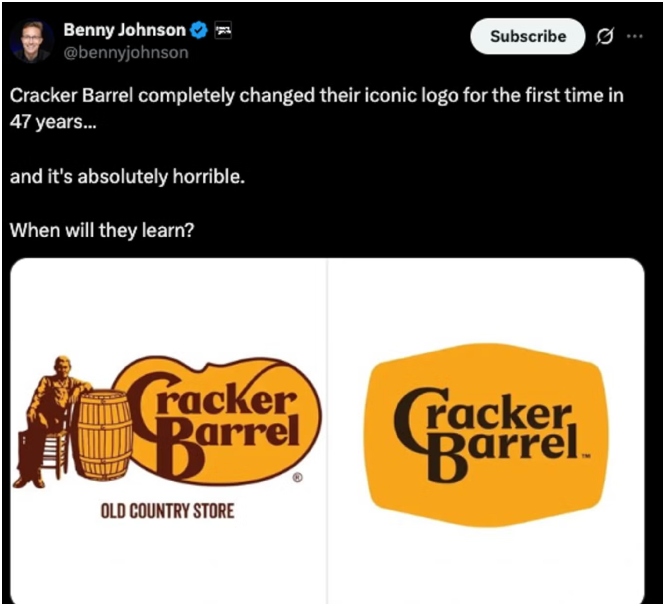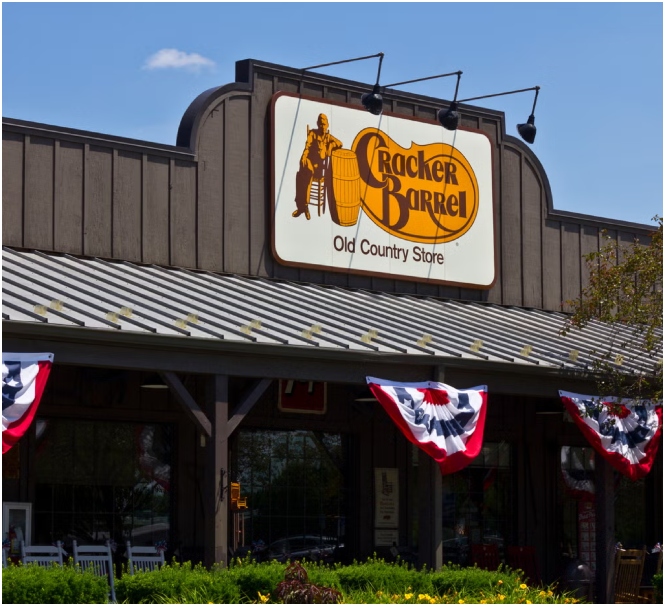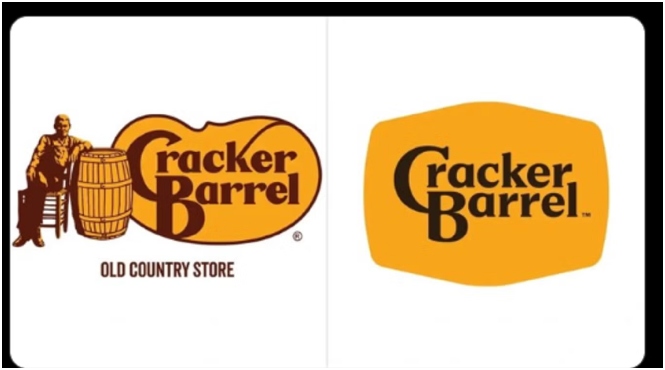When Cracker Barrel Old Country Store announced a refreshed logo this month, the company likely expected little more than nostalgic nods to its branding history.
Instead, the Tennessee-based chain found itself at the center of a new culture war firestorm — and facing civil rights complaints that could trigger regulatory scrutiny.
This explainer breaks down what happened, why it matters legally, and what could come next.
1. What Changed in the Logo?
- Before: Since 1977, Cracker Barrel’s logo featured the name alongside a seated man in overalls leaning against a wooden barrel. The imagery was designed to signal folksy Americana.
- Now: The redesign removes the figure entirely, leaving only the stylized barrel and wordmark, echoing the brand’s original 1969 look.
The company described the move as the “fifth evolution” of its visual identity and said it was “rooted even more closely to the iconic barrel shape and word mark that started it all.”
On the surface, it’s a routine branding update. But in the current political climate, even logos can become legal and cultural flashpoints.
2. Why Are Conservatives Outraged?

- Political symbolism: Critics argue the redesign represents the company “abandoning tradition” in favor of a sterile, modern aesthetic.
- Cultural context: Right-wing pundits likened it to Bud Light’s 2023 controversy, when the beer company faced boycotts over a partnership with transgender influencer Dylan Mulvaney.
- Online reaction: Figures such as Donald Trump Jr. and commentator Benny Johnson blasted the change, framing it as part of a broader “woke corporate” trend.
The uproar spilled beyond aesthetics into hiring practices, where Cracker Barrel’s diversity, equity, and inclusion (DEI) commitments became a target.
3. What Legal Complaints Have Been Filed?

The most significant development is the involvement of America First Legal (AFL), a conservative advocacy group founded by former Trump administration officials.
- AFL claims Cracker Barrel’s DEI policies violate Title VII of the Civil Rights Act of 1964, which prohibits employment discrimination on the basis of race, color, religion, sex, or national origin.
- Complaints have reportedly been submitted to:
- The Equal Employment Opportunity Commission (EEOC)
- The Tennessee Attorney General’s Office
The argument: By pledging to “identify, recruit, and advance” underrepresented groups, AFL says Cracker Barrel is engaging in race-conscious hiring that could disadvantage other applicants.
4. Could the Complaints Succeed?
Legal experts note that:
- DEI programs are not inherently illegal. Courts have generally upheld diversity initiatives that set aspirational goals rather than quotas.
- Risk area: If evidence shows hiring or promotion decisions were explicitly made based on race, that could be problematic under Title VII.
- Regulatory impact: Even if the complaints don’t result in penalties, EEOC inquiries could pressure Cracker Barrel to modify or clarify its policies.
5. What About Shareholder Lawsuits?
The backlash hasn’t only been political — it’s financial. Cracker Barrel’s stock dropped about 10% after the redesign was unveiled.
That raises the specter of shareholder litigation:
- Investors could argue management failed to anticipate backlash that caused measurable financial harm.
- Similar lawsuits have followed corporate controversies when branding or social decisions were tied to sudden stock declines.
- Directors’ fiduciary duty includes considering reputational risks alongside traditional business concerns.
6. How Does This Compare to Bud Light?
The Bud Light boycott offers a cautionary tale:
- Sales dropped by billions after conservatives targeted the brand.
- Anheuser-Busch faced shareholder lawsuits and long-term brand damage.
- The controversy became a case study in how quickly culture wars can impact corporate balance sheets.
Cracker Barrel now risks being positioned as the “Bud Light of family dining,” especially if boycotts gain traction.
7. What’s the Broader Takeaway?
This controversy shows how corporate decisions — even those as small as a logo redesign — can trigger:
- Civil rights complaints under Title VII
- State attorney general reviews
- Shareholder pressure and potential litigation
- National culture war battles amplified by social media
As AI developer Mario Pawlowski pointed out, boycotts also risk collateral damage, potentially affecting the livelihoods of 77,600 employees across 660 locations.
Final Word
For Cracker Barrel, the logo change was meant to signal tradition. Instead, it’s testing the company’s ability to navigate regulatory scrutiny, shareholder risk, and partisan outrage.
The episode underscores a legal reality: in today’s climate, even branding decisions can quickly become employment law disputes and corporate governance challenges.

